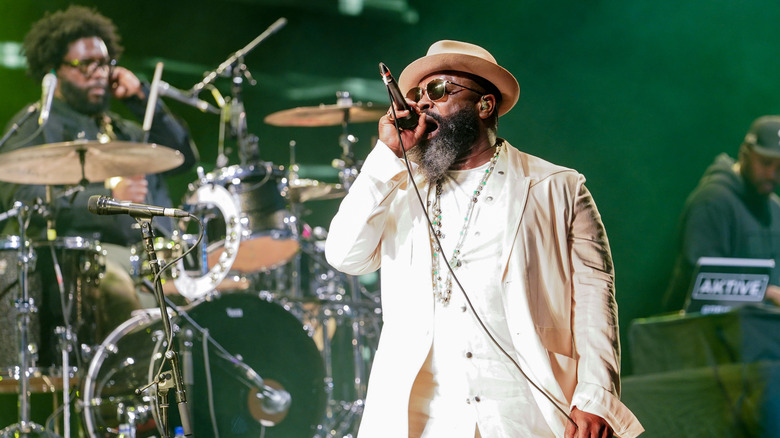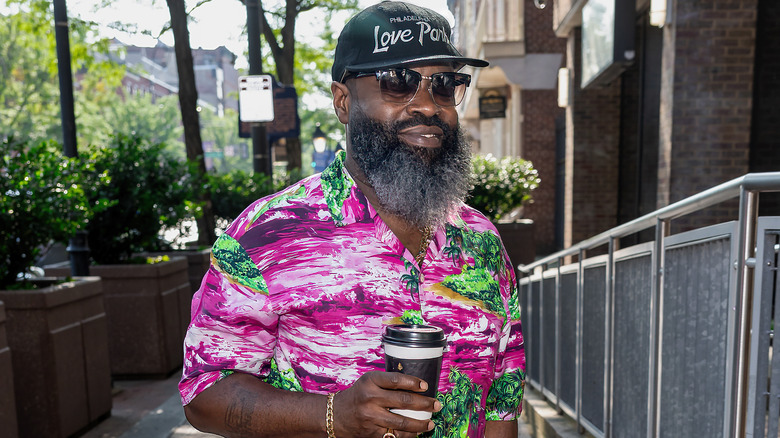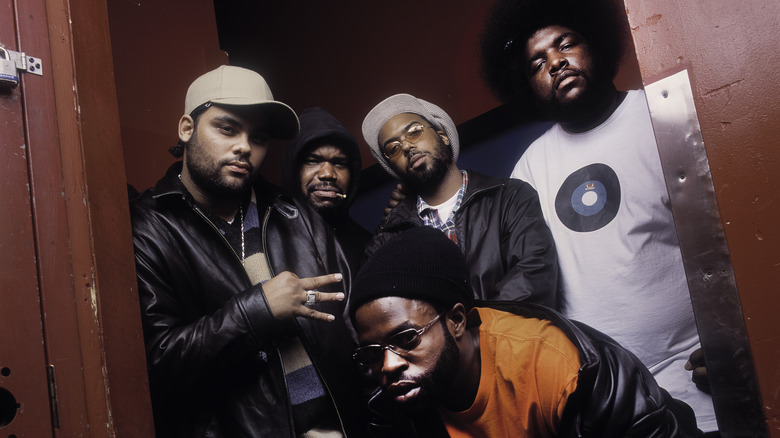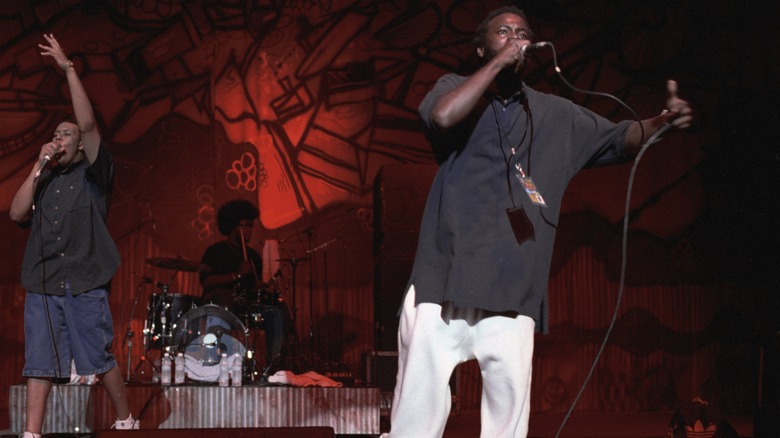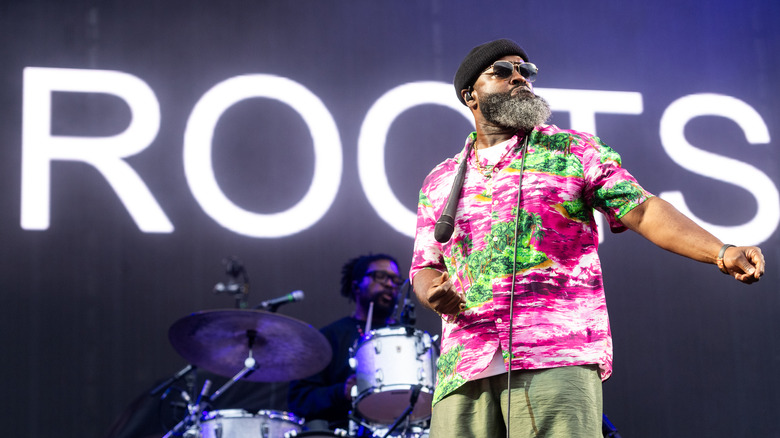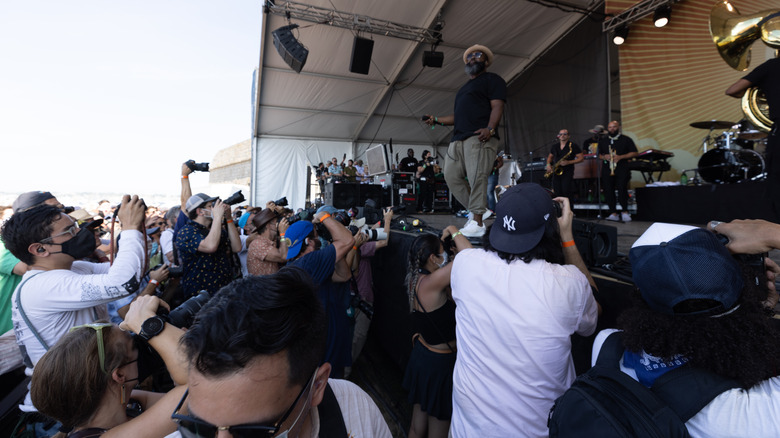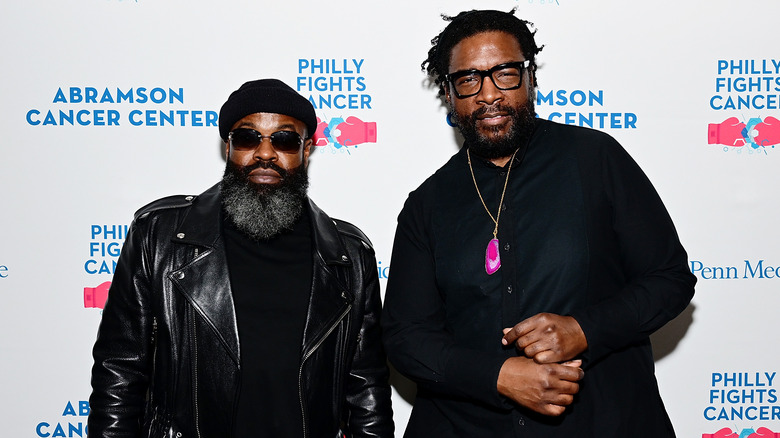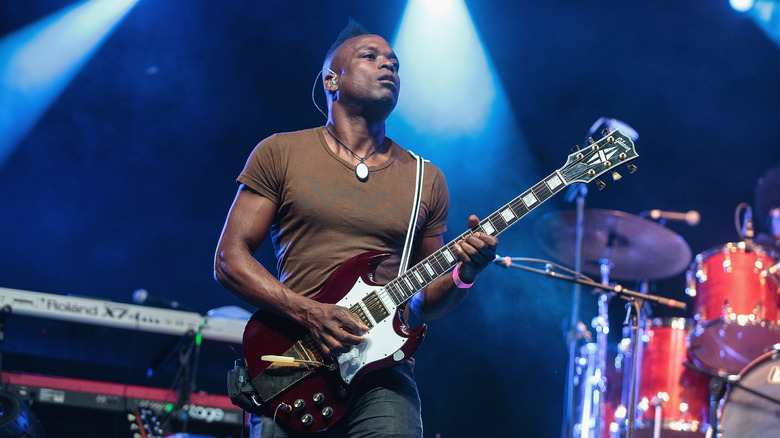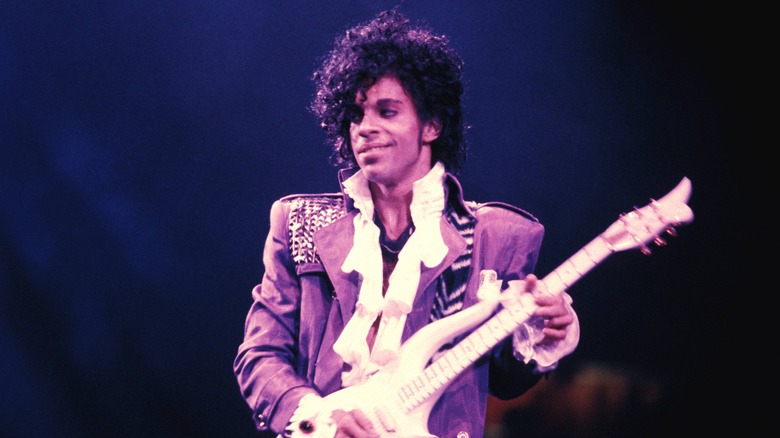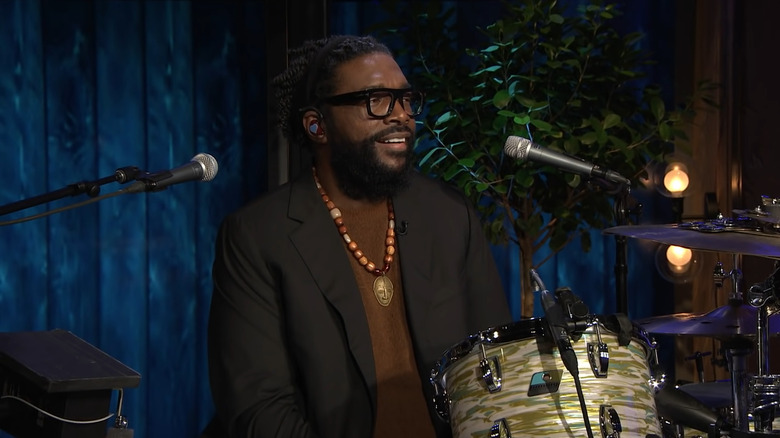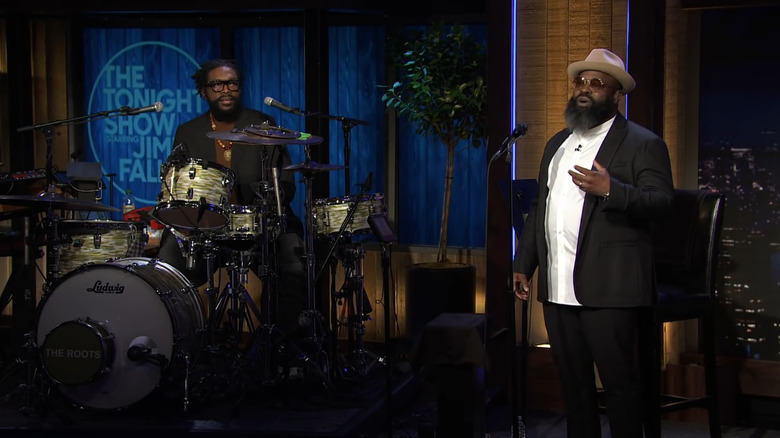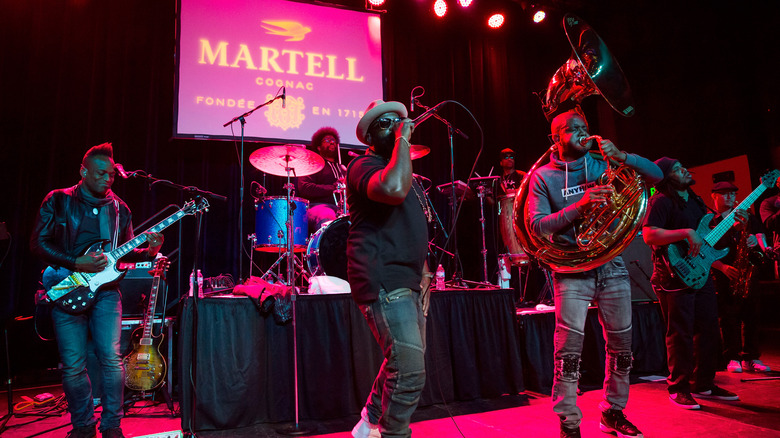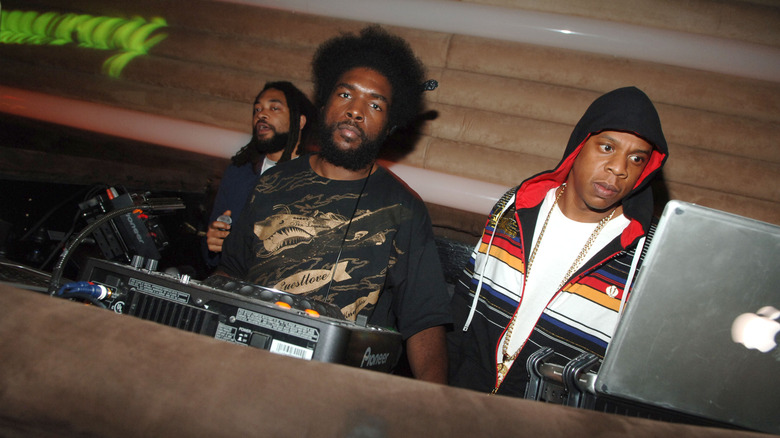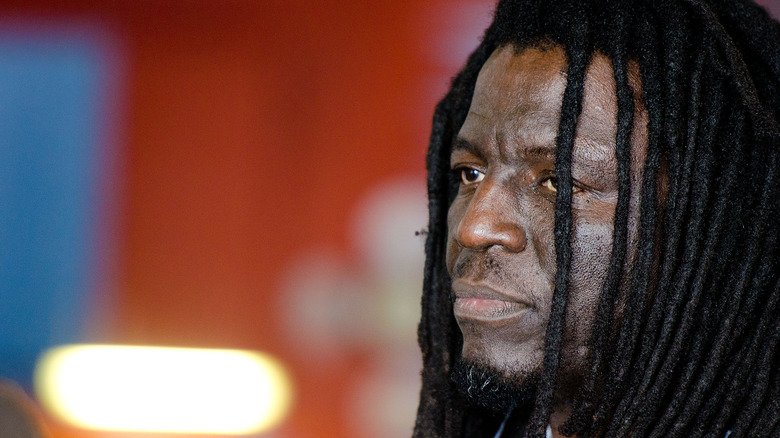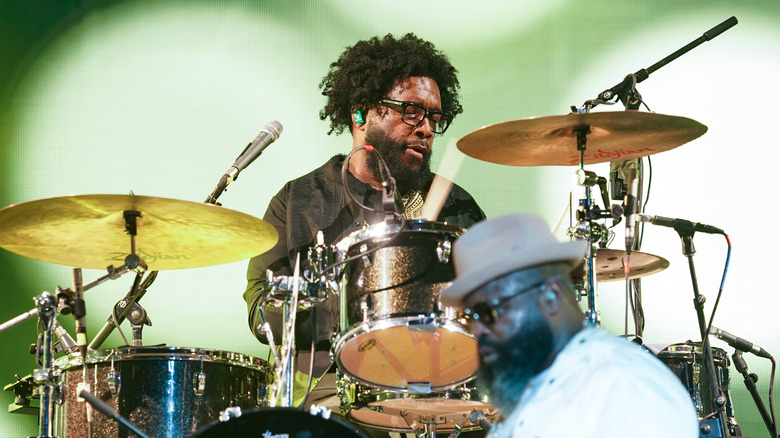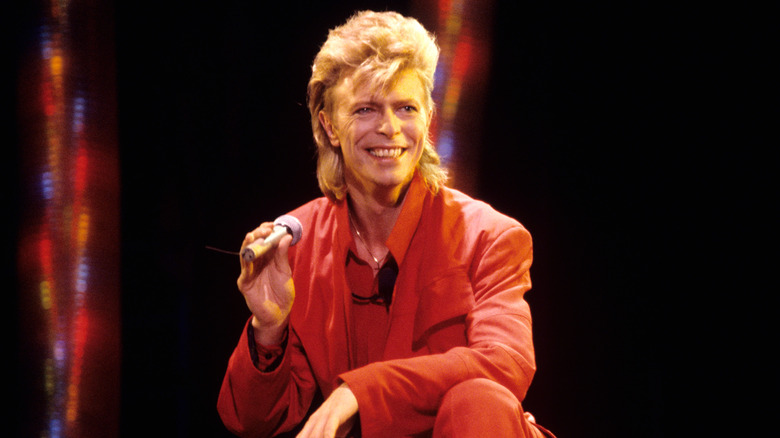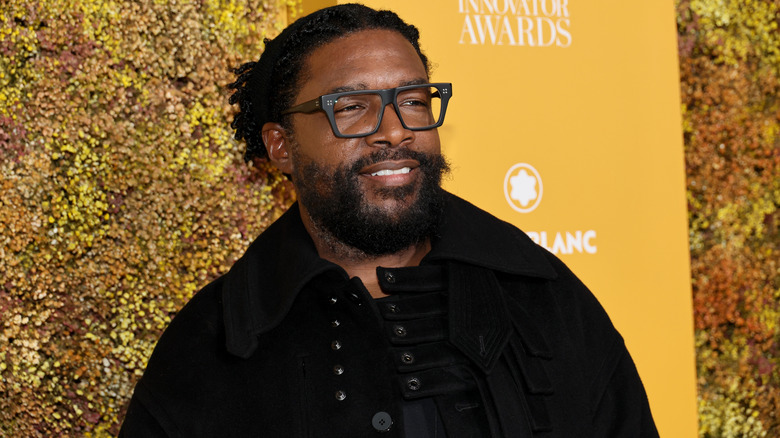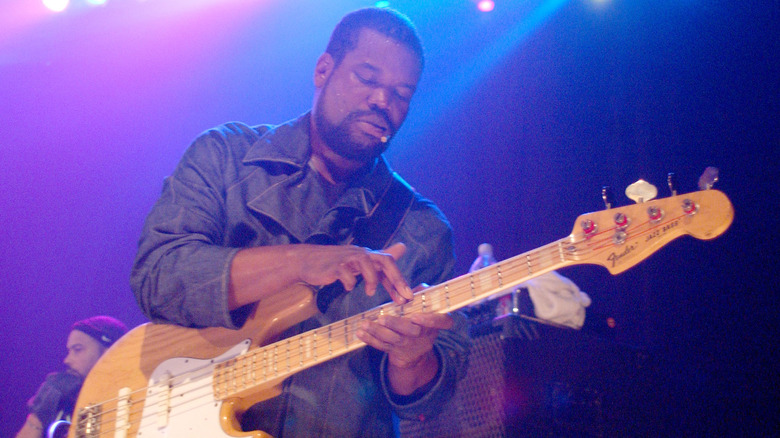The Untold Truth Of The Roots
Musicians Tariq "Black Thought" Trotter and Ahmir "Questlove" Thompson combined their creative powers to form one of the most seminal hip-hop groups of all time: The Roots. Throughout the Philadelphia-based outfit's history, only Black Thought and Questlove have remained constants, as other members jet in and out of this sonic operation. The revolving door of musicians hasn't hurt the Roots for one second, though, as they continue to hold the respect of their peers, inspire the next generation of artists, and reach a wider audience through their "day job" as the house band for "The Tonight Show Starring Jimmy Fallon."
While their unmistakable brand of hip-hop draws in a diverse range of listeners and gets the musical world talking whenever they release new music, their rise to the top hasn't been without its challenges and turning points. The Roots overcame tragedy, dealt with the doubters, had Prince smash up one of their guitars, and even upset a politician in an incident that threatened to derail their entire career. Needless to say, their story is about as twisty and fascinating as their music — and they aren't done just yet.
Black Thought says music saved his life
Before the Roots formed, Black Thought and Questlove were high school friends who shared a mutual passion and appreciation for music. Unquestionably, it was a relationship that melted their musical journeys into a unified path, but it also held major significance for another reason. As Black Thought revealed to NPR, his bandmate was there for him during one of the darkest moments of his life. While still in high school, Black Thought's mother was murdered. Expectedly, the event shocked him to the core, but he found solace in the power of music and Questlove's friendship.
"Music was there for me when I needed it to be, and Ahmir and his family was there for me," Black Thought said. "I was very much at a crossroads. I could have processed that trauma and the experience in the loss in a different way, and just been at a very different place today."
As Black Thought explained, many other North Philadelphia youths didn't believe in promising futures or lengthy lives as drugs ran rampant in the '80s. He understood how his life could have been derailed too, especially after such a traumatic event, but he chose a different road — one filled with music and his high school pal coming along for the ride.
The Roots consider their fourth album as the turning point
In 1993, the Roots released their debut album, "Organix." It wasn't distributed through a major label but independently, as the band peddled it at their European shows and tried to attract enough attention from the music industry. It worked, as it generated enough hype to get them snapped up by DGC Records. However, their next two major label releases weren't quite the big breakthroughs that turned the Roots into a global attraction. That only happened after their fourth album, 1999's "Things Fall Apart," which was released via MCA Records.
Questlove told Vibe that from the time they recorded "Organix" to "Things Fall Apart," they experimented and attempted different approaches to see what would connect with the wider audience. Eventually, they nailed it. "We finally got it with our fourth album 'Things Fall Apart,'" Questlove said. "That opened so many doors for us."
The album produced the hit track "You Got Me," which secured the Roots the win for Best Rap Performance by a Duo or Group at the 42nd Grammy Awards, while "Things Fall Apart" was also nominated for Best Rap Album, ultimately losing out to Eminem's "The Slim Shady LP" in the end. In 2013, the album was certified platinum for selling over 1 million copies worldwide.
They were discovered in an exotic dance club
In the early days, the Roots didn't have the luxury of picking and choosing which shows to play, so they took whatever came their way, including frat parties and exotic dance clubs. As Questlove revealed on the "Til This Day with Radio Rahim" podcast, one of the Roots' defining gigs happened in a North Philadelphia strip club known as the Princess Lounge, which held a talent show for upcoming rap artists.
While the band looked out of place when they hit the stage, they soon won everyone over by playing A Tribe Called Quest song. As it turns out, there was an important person in attendance who approached the Roots soon after their performance and made them an offer they couldn't refuse. It ultimately changed the course of their career.
"One of the guys happened to be a local college radio DJ legend named AJ Shine, who then presents to us the idea: 'Yo, I want to record y'all. Let's do a 12-inch single,'" Questlove said. "That 12-inch single winds up being an EP, which then winds up being [a] 16-song record, which then winds up being kind of our demo. And within a year's time we finally get a record deal."
Questlove doesn't think The Roots mastered the art of pop
Even though most music falls into the confines of genre, there are those rare musicians who transcend the boundaries and become beloved by mainstream audiences, regardless of how their songs are classified and grouped. In essence, they possess a pop sensibility — and that's a powerful ability to wield in the music industry. While the Roots don't strictly cater to hip-hop or rap audiences, Questlove doesn't believe they have reached that pivotal point of being universally beloved for their music.
Speaking to The Believer in 2003, he said, "The thing is, we, the Roots, have mastered the groove element. We've mastered virtuoso lyricism. We've mastered the art element. But we haven't mastered the pop craftsmanship of writing songs." As Questlove explained, the Roots are recognized for their talent and have an audience who loves what they do, but they aren't a household name like Prince because of their musical appeal.
That being said, the band has made serious strides to change this — namely taking the gig on "Late Night with Jimmy Fallon" and later the higher-profile "The Tonight Show Starring Jimmy Fallon," which has helped them reach broader demographics and more viewers than ever before.
They refuse to cater to just one demographic
By infusing a plethora of genres and eclectic beats in their music, the Roots appeal to more than the general hip-hop audience. One only needs to take a look at the people in attendance at their concerts to get a snapshot of their wide fanbase. Turns out this isn't coincidental but entirely intentional on the band's part.
Speaking to I am Hip-Hop Magazine, Black Thought discussed the Roots' ability to cross over a multitude of genres and lure in different audiences from all walks of life. "From the start of our career we've always had an extremely diverse audience because we've never catered to any demographic specifically," he said. "We've always you know, shot universally, and we've always tried to play both sides of the shape and we always transcended gender and age and location and all that."
In addition, Black Thought explained that their ability to play their instruments live makes a big difference to their shows and helped them to stand out from the pack back in the day, especially when other hip-hop artists weren't making use of backing bands. Without a doubt, playing the instruments live adds an organic and natural experience to their performances.
Questlove and Black Thought had a physical altercation
It isn't unusual to read about flare-ups between band members, especially if they have been performing together for a long time. Much like family, being in such close proximity and spending a lot of time with one person can trigger irritation or frustration — whether rational or not. The same holds true for the Roots, as Black Thought told NPR about the time when he and Questlove had it out with each other. However, their dispute went a step further and resulted in them coming to blows.
"We had a brief sort of scuffle, kerfuffle, a little 30-second altercation when we were young and just starting out," Black Thought said. "We were displaced, living in London and there was just lots of angst and anxiety ... With all the energy associated with anyone's first time putting out a record. ... So, yeah, just the perfect storm of events."
He explained how he let go of the incident fairly quickly, but he felt it wasn't something that Questlove had done. That said, Black Thought doesn't believe there's any lingering animosity over the incident between the pair.
Captain Kirk Douglas was a preschool teacher before joining The Roots
Over the years, the Roots boasted a number of talented musicians in their ranks, with several of them sticking around for a while before moving on to other pastures. In 2003, New Yorker Captain Kirk Douglas joined the band and brought his guitar virtuoso skills to the party. While he had been ax-slinging since the age of 10 and playing in numerous bands, it took a while for his musical career to truly take off to the next level, as he revealed to American Songwriter.
Douglas moved from Long Island to Manhattan because of a band that he was playing with at the time. "Upon doing that, I got a job as a preschool teacher teaching preschool during the day and at night I was playing in various bands, playing CBGB, playing Joe's Pub, playing Wetlands all the time," he said. "I'd play sometimes four gigs a week. I was playing with 10 or 11 different bands. It was just fun."
Douglas caught the attention of the Roots' manager; however, he envisioned the guitarist for other bands he worked with then. After guitarist Ben Kenney departed the Roots, Living Colour's Vernon Reid helped fill the gap on a few dates before recommending Douglas for the full-time gig. A few others also recommended Douglas to the band, and the rest is history.
Prince broke The Roots' guitar
Any musician worth their weight in salt appreciates what Prince brought to music as an artist and undeniable symbol of creativity. The multi-instrumentalist and hitmaker left quite the legacy, and the Roots shared a humorous story about an incident featuring him and a broken guitar. Speaking at the Paley Center for Media in New York (via Variety), the Roots and Jimmy Fallon gathered to discuss memorable tales from "The Tonight Show," where Prince's appearance was brought up.
Reportedly, the musician's guitar tech forgot to pack the icon's guitar for the performance, but it would prove to be no big deal because Captain Kirk Douglas lent his prized Epiphone to Prince. Now, most musicians would happily die and enter the gates of Valhalla if a legend like Prince used their gear, but Douglas was left astounded (and not in a good way) by what happened at the end. Never one to miss a moment of theatricality, Prince threw the guitar up into the air as he exited the stage but no one caught it, so it smashed to the ground and split into two.
However, Prince didn't just shrug off the incident, say, "Sorry, bro," and retreat to his mansion. The musician actually paid for Douglas to get a new guitar as a replacement.
The Jimmy Fallon Show brought the band closer
After playing together for over two decades and turning their music into their livelihood, the Roots took an unexpected pivot in their career by becoming the house band for "Late Night with Jimmy Fallon" in 2009 then moving over with the host when the show became "The Tonight Show Starring Jimmy Fallon." No one saw this move coming, but it was an essential one for the band's survival, as Questlove revealed on Conan O'Brien's podcast.
Questlove discussed how while on tour with the Red Hot Chili Peppers, he noticed how the band would stop between songs and huddle together to show appreciation for what they had achieved. While Questlove initially dismissed it, the Roots' manager told him it showed how the Chili Peppers genuinely liked each other's company as opposed to the Roots who acted more like business associates than friends. It made him take pause and realize their manager was right — something had changed along the way.
After Jimmy Fallon insisted on the Roots being his house band and they accepted, they started to spend more time together doing all sorts of activities and taking each other less seriously than before. Ultimately, this took them back to the early days when they were pals enjoying riding the wave of playing music together.
NBC wasn't sure about The Roots
From the get-go, Jimmy Fallon made it clear he wanted the Roots as the house band on his late-night show. In fact, the group has gone into detail about the lengths he went to convince them to say yes. However, it might have been a different band supporting Fallon had the network NBC gotten its way initially.
Speaking to NPR, Questlove said, "The feelings at NBC were sorta like, 'Well, we know they're a good rap group but, what if we have [country artist] Tom T. Hall on the show? Do they have range?'"
He added how the network suggested a 13-week probation period for the Roots where they would meet with NBC weekly to discuss how they were doing. According to Questlove, the network put them on the spot with serious musical challenges to see how they would react and perform in the moment, but when the band knocked it out of the park, the probation period was waived and they were officially welcomed onboard.
They partnered with a cognac brand
The Roots are far removed from following the conventional path in their career. They take risks and explore opportunities that other artists might not even consider, such as their decision to become Jimmy Fallon's house band. Another interesting partnership materialized in 2015 when the Roots partnered with Martell Cognac for The Vanguard Series tour, which would feature the Roots performing in exclusive events around America in celebration of the brand's 300th anniversary.
Speaking to Vibe, the band revealed this collaboration took a few years to happen, but it also saw them having input in how it would turn out. "It was presented to us as an opportunity to link up with a brand that's comparable to us in an abstract kind of way," Black Thought said. "This is called The Vanguard Series. The Roots are well-respected and considered vanguards in the music. We're mavericks in our own world and that's kind of what Martell is."
Why Jay-Z was scared of signing them
In 2004, the Roots released their sixth album, "The Tipping Point." It was a musical departure from their previous efforts and received a lukewarm reception from critics but still landed at the No. 4 spot on the Billboard 200. Not too long after, the band was on the lookout for a new label to call home after departing Geffen Records.
Step forth Jay-Z — the rap mogul and then-president of Def Jam Recordings. However, it wasn't plain sailing for the Roots and Def Jam, as Questlove explained to Complex. He revealed that Jay-Z held initial reservations over signing the Roots to his label. "The album that came before our first Def Jam album was 'The Tipping Point,'" Questlove said. "[At that time] we didn't have a relationship with Jimmy Iovine at Geffen. So we had to approximate what we thought he would like. So, we kind of stumbled. Jay was like, 'I don't want to look like the bad guy here. I don't want to look like the guy that destroyed America's rap group.'"
In the end, the gamble paid off as the Roots' seventh album, "Game Theory," received much more critical acclaim than their previous effort and even received a Grammy nomination for Best Rap Album.
They considered their manager as the brains of the band
Quite often, fans see successful bands and believe the artists made it purely through a combination of perseverance, hustle, and talent that couldn't be ignored. While a certain element of this is true — plus the concept of right place, right time — there are also people behind the scenes who play a major role in their achievements. For the Roots, this was their manager Richard "Rich" Nichols who passed away in 2014. For over 20 years, Nichols managed the band and saw them rise from underground darlings to radio chart toppers.
Discussing their long-gestating 17th album "End Game," which would mark the Roots' first record since Nichols' passing, Black Thought opened up to Stereogum about how much of an influence their manager had on them as artists. "I feel like it's a new era in that we have lost Richard Nichols, who was very much the brains of this operation," he said. "He represents an element of the Roots' creative process that can never be replaced. There's something to be said about this being our first Roots project that we're going to put out without him at the helm."
The Roots offended a Jimmy Fallon guest
Part of the charm of Jimmy Fallon's show is how musical cues are played when guests make their way out on stage. The Roots haven't been afraid to get tongue-in-cheek with the walk-on music for guests in the past; however, one time, their choice of a number caused quite a stir.
In 2011, Republican Party representative Michele Bachmann appeared on "Late Night with Jimmy Fallon." As she made her way out, the Roots played Fishbone's "Lyin' A** B****." While Bachmann didn't react at the time, news of the song choice spread after her appearance and caused controversy. Afterward, the Republican representative appeared on Fox News and called for an apology from the network, questioning if the same song would have played for then-first lady Michelle Obama if she had walked on stage.
Soon after, Fallon sent out a public apology to Bachmann about the incident on X, formerly known as Twitter. The Roots' Questlove also released an apology through his representative (via ABC News), saying, "The performance was a tongue-in-cheek and spur of the moment decision. The show was not aware of it and I feel bad if her feelings were hurt. That was not my intention." Years later, Questlove revealed how the incident almost resulted in him and the band being fired from the show, but they rode out the outrage until it fizzled out.
They pulled out of a David Bowie tribute concert
In January 2016, the music world was rocked by the news that David Bowie had died from cancer. Expectedly, tributes came from across the industry, and a decision was taken to put together two tribute concerts at Carnegie Hall and Radio City Music Hall in New York to honor the legendary rocker. The line-up was set to feature the Roots performing on both shows; however, Questlove took to his Instagram account to announce the band — as well as others — had pulled out at the last minute. The drummer claimed there were issues about artists sharing equipment and said the band had no time for such trivial matters.
Organizer Michael Dorf issued a statement (via Pitchfork) about the incident, suggesting there had been crossed wires at a rehearsal and he hoped clearer heads would prevail. In the end, the Roots didn't perform at the concerts; however, they did team up with Kimbra and David Byrne to perform Bowie's hit song "Fame" at the 2016 Rock and Roll Hall of Fame ceremony.
Questlove was sued for racial discrimination
In January 2018, two former crew members of "The Tonight Show Starring Jimmy Fallon" filed a lawsuit against the network NBC and the Roots' Questlove, alleging racial discrimination and wrongful termination for their firing. Camera operators Kurt Decker and Michael Cimino demanded $1 million in restitution. As per Deadline, Decker and Cimino slammed NBC's handling of the investigation after claiming to have received "an unsolicited racist and misogynist text message from a 'Tonight Show' stagehand."
The pair stated they reported the message to NBC staff and even the Roots' manager, but they were soon terminated. In their filing, Decker and Cimino alleged their firing was a direct result of Questlove urging for them to be let go, even though an African-American member of the Roots had received the same text as well.
In October of the same year, the lawsuit was dismissed. However, there was an arbitration order passed, which means the parties would need to come together and resolve the matters behind closed doors and outside of the public sphere.
A former member's widow sued The Roots
While Black Thought and Questlove are seen as the official co-founders of the Roots and played in different versions of the band before it took its final name, other members contributed to the group's success. One of these people was the late Leonard Hubbard, who played bass for the Roots from 1992 to 2007. Hubbard left the band after being diagnosed with blood cancer and died in 2021.
In March 2023, Rolling Stone published a report that Hubbard's widow, Stephanie, had filed a lawsuit against several entities and individuals, including Questlove and Black Thought, alleging they had defrauded Hubbard. According to the claims, Hubbard, Questlove, Black Thought, and Malik Smart created a company for band business, whereby each of them held different stakes and percentages in the enterprise. However, throughout the years and various practices, Hubbard allegedly didn't receive his fair share.
The Hubbard estate's lawsuit claimed that the bassist was defrauded out of millions of dollars and not compensated based on what was agreed upon. In addition to the demand that the estate receive financial compensation for the damages and legal fees, a request was put in to freeze the use of the Roots' brand as intellectual property until its true worth could be ascertained. However, in June, Hubbard's widow dropped the lawsuit, although it's unclear why as no news of a settlement was announced.
